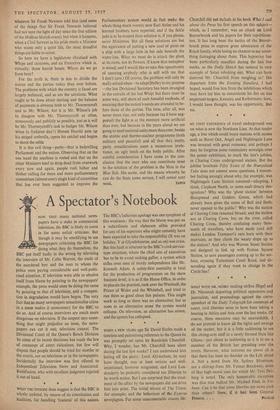WHAT THE EPISODE does suggest is that the BBC iS
wholly unfitted, by reason of its constitution and tradition, for handling 'features' of this nature. The BBC's ludicrous apology was one symptom of this weakness : the way that the blame was put on a subordinate and elaborate alibis provided for any of his superiors who might remotely have been expected to take the responsibility (X was on holiday, Y at Glyndebourne, and so on) was crass. But this fault is inherent in the BBC's civil-service- type structure, where the chief aim of executives has to be to avoid making gaffes; a system which stifles even men of sturdy independence like Mr. Kenneth Adam. A safety-first mentality is fatal for the production of programmes on the show business level; it is as if the Home Office, in order to placate the prurient, took over the Windmill, the Prince of Wales and the Whitehall, and tried to run them as good clean fun palaces. This might work so long as there was no alternative; but as soon as an alternative arose the system would collapse. On television, an alternative has arisen; and the system has collapsed.






























 Previous page
Previous page